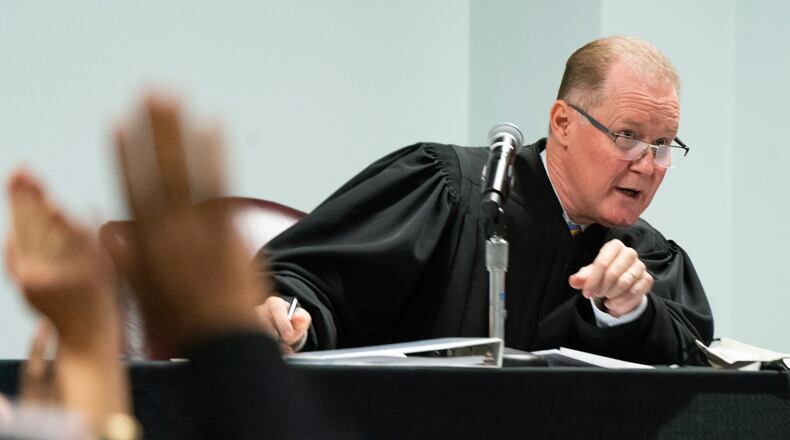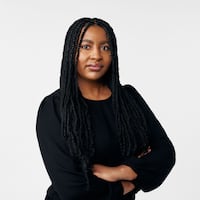BRUNSWICK - Juror 381 took part in the “#IRunWithMaud” movement and posted a video about it on social media. Asked last week what crime had been committed when Ahmaud Arbery was chased, shot and killed, the former law enforcement officer replied, “Murder?”
Juror 383 said she knows Roddie Bryan. She taught his child and used to scuba dive with his fiancee, with whom she’s still Facebook friends. Another woman, Juror 72, described the shooting as a “hate crime” and told the court she didn’t believe in “vigilante justice.” All three are among the qualified group of potential jurors that could end up determining the fate of the three men charged in the 25-year-old’s death.
The ideal juror to sit in a criminal trial is someone who’s essentially a blank slate. They typically know nothing about the case and don’t know the victim or the defendants. They can be fair and impartial to both sides.
But here in Glynn County, a coastal Georgia community of about 85,000, finding such a person has proved daunting over the past two weeks. Some knew Arbery, some know the defendants and many have already formed opinions about the men standing trial.
“This is a fraught jury selection. It’s a small town, a local community and this is a case that has garnered nationwide attention,” said Dr. Ziv Cohen, a forensic psychiatrist who works at Cornell University and has consulted on dozens of murder cases. “Certainly in the local community, people can’t have ignored it. And it’s hard to find someone who hasn’t formulated an opinion, especially with a video.”
The widely shared cellphone footage of the shooting has been seared into some prospective jurors’ minds, they say, and this case has been the talk of the town since Arbery was killed Feb. 23, 2020. Several have said they can’t forget the footage of Ahmaud collapsing in the street and, for that reason, say they simply wouldn’t be able to consider the case objectively.
Those jurors have been dismissed because they can’t be fair and impartial. Other potential jurors who’ve made it to the next round have said they’d be willing to set aside their personal opinions of the case — even if it’s clear they’re already leaning one way or another.
“This court is looking for a level playing field, but of course this video is out there and people have seen it in the news,” lead prosecutor Linda Dunikoski said during one exchange.
As of Friday, the court had qualified 55 of the 64 prospective jurors needed before attorneys can begin exercising their strikes. That pool will be whittled down to 12 jurors and four alternates ahead of opening statements, which could begin midweek.
Travis McMichael, 35; his father Greg McMichael, 65; and their neighbor Bryan, 52, stand accused of murder and other charges. Arbery, who was unarmed, was killed in the Satilla Shores neighborhood just outside Brunswick after the McMichaels, who suspected him in a string of neighborhood break-ins, grabbed their guns and chased him in a pickup truck. Bryan got in his own vehicle and joined in the pursuit.
The video he recorded captured Travis McMichael shooting Arbery at close range during a struggle over the shotgun in the middle of the road. The killing thrust the town into a national spotlight, sparking outrage from many who believe the Sunday afternoon shooting was racially motivated.
Arbery was Black. The McMichaels and Bryan are white.
“It seemed Ahmaud was scared for his life and chose to defend himself against Travis and Gregory McMichael, who were armed,” juror No. 386, a Black man, wrote on his questionnaire. He also wrote that be believed everyone was innocent until proven guilty, and he was among the potential jurors qualified.
He bluntly told the court that had Arbery been white, “it wouldn’t have happened.”
“I feel like he was a young Black kid out running in the neighborhood,” the man said. “They probably didn’t know him. I guess they felt threatened.”
Then there was Juror 236, who worked with Greg McMichael three decades and said she had a positive relationship with him. She was qualified.
Asked by prosecutor Paul Camarillo if she had an opinion on the defendants’ guilt or innocence, she said, “I don’t understand why they took it into their own hands.”
“That’s the only thing that disturbs me about that day,” she said. “I would have called 911 and let the police handle it.”
Denise de La Rue, who has been a jury consultant in some of the nation’s most high-profile cases, said she is surprised some of the prospective jurors made it through the first round of questioning.
“That’s stunning to me,” said de La Rue when told about some of those qualified so far.
“Jurors want to believe they can be fair and impartial. All of us think of ourselves as fair people, and most of us are in most circumstances,” she said, but “there are situations in which we just simply could not be unbiased.”
Juror 236, however, described herself as “completely neutral” and said she could remain fair-minded if selected, though she expressed concerns that serving on the jury could lead to “an appearance of impropriety” given her prior working relationship with Greg McMichael.
“I don’t want to be a distraction and be a problem for a case that’s already caused problems in our community,” she said shortly before being qualified.
The prospective jurors are identified only by their number in court, and Judge Timothy Walmsley has instructed the media not to reveal personal information that would make them easily identifiable.
On Tuesday afternoon, a woman who previously shared an “I Run with Maud” sticker to her Facebook page was also selected for the pool of qualified jurors over the objections of the defense. Of the 20-member panel questioned that morning on the second floor of the courthouse, she was the only one who raised her hand when asked who wanted to serve on the case.
“We want to see justice done,” Juror 479 said in response to questions from the prosecution. “I want everything to be fair, that’s my opinion. Everybody’s due their day in court.”
The woman said she believes people of color are treated unfairly by police and the legal system. She also said she thought the old Georgia flag, which prominently featured the Confederate battle emblem, was a racist symbol. Travis McMichael had a vanity plate of the former state flag on the front of his pickup at the time of the shooting, but Walmsley has yet to rule whether that can be presented as evidence at trial.
Laura Hogue, one of the attorneys representing Greg McMichael, made a motion to have the Juror 479 dismissed.
“I don’t think this juror is appropriately qualified,” she said Tuesday night, asking Walmsley to strike the woman for cause. That motion was denied.
Walmsley said he found the juror to be “quite open and candid” and qualified her.
De La Rue was shocked the woman made it to the next round of jury selection.
“The fact that a juror had the picture frame ‘I run with Maud’ and coupled with the fact that the juror says she wants to serve, and then to see that justice is done. What could that possibly mean to that juror?” de La Rue asked. “What could justice possibly look like? I can’t fathom that that’s a juror who is truly qualified to serve on this jury.”
De La Rue said it’s clear some of those who have qualified may have a tough time setting their opinions aside, and called it “a bit concerning.”
Prosecutors expect the trial to continue through Nov. 19, the Friday before Thanksgiving.
To learn more, listen to The Atlanta Journal-Constitution’s ‘Breakdown’ podcast. Now in its eighth season, it is covering the case in depth and will be dropping episodes every Monday during the trial.
Keep Reading
The Latest
Featured





